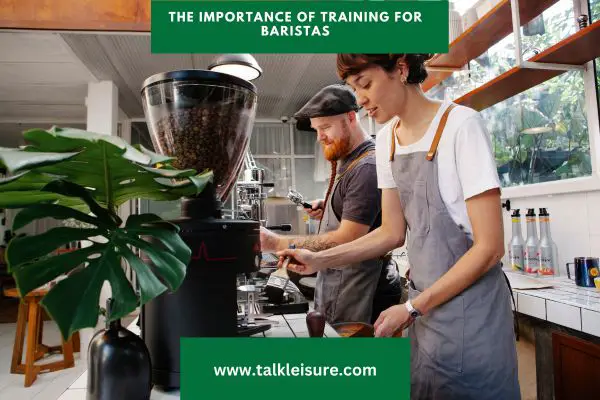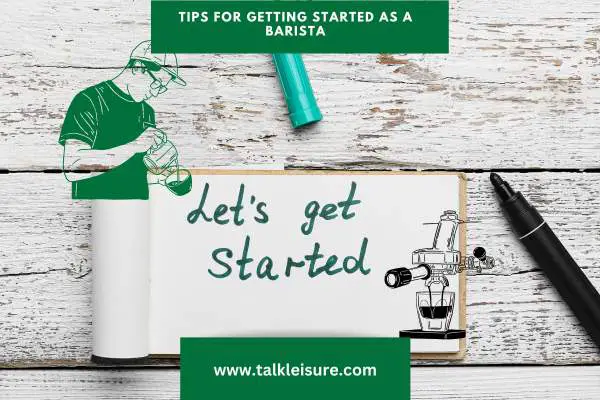Hey there! Are you considering a career as a barista but wondering if you need prior experience? Well, you’ve come to the right place! I understand the importance of having the right skills and knowledge to make a great cup of coffee.
But the question remains, do you really need experience to become a barista? In this blog post, we’ll explore the answer to this question and provide you with some tips on how to get started in the world of coffee. So, grab a cup of your favorite brew and let’s dive in!
Do You Need Experience to Be a Barista? Exploring the Path to Become a Barista
While having prior experience as a barista can certainly be helpful, it’s not always a requirement. Many coffee shops and cafes are willing to hire people with little to no experience as long as they have the right attitude, work ethic, and willingness to learn.
That being said, most employers will expect you to have at least some basic knowledge of coffee and espresso, as well as the ability to operate commercial espresso machines and other coffee-making equipment. This is where training comes in.
There are many training programs available for aspiring baristas, both online and in-person. Some popular options include taking an online course like the Specialty Coffee Association’s Barista Skills program and the Barista Hustle Online Course.
These platforms offer convenient ways to enhance your barista skills from the comfort of your own home.
These programs can teach you everything from how to properly steam milk to the science behind coffee extraction.
In addition to technical skills, there are a few other qualities that can make you a great barista. These include:
- Attention to detail: Making great coffee requires precision and consistency, so a keen eye for detail is key.
- Customer service skills: As a barista, you’ll be interacting with customers all day long, so being friendly, personable, and able to handle a fast-paced environment is important.
- Passion for coffee: To truly excel as a barista, you should have a genuine love for coffee and a desire to learn more about it.
So, while prior experience can certainly be an asset, it’s not always necessary to become a barista. With the right training and attitude, anyone can learn the skills needed to make a great cup of coffee.
The Importance of Training for Baristas: How Training Can Help You Become a Skilled Barista

Training is crucial for anyone who wants to become a skilled barista.
While some coffee shops may be willing to hire baristas with no experience, most employers will expect you to have at least some basic knowledge and training in coffee preparation and customer service.
There are several reasons why training is important for baristas:
- Consistency: One of the most important aspects of being a barista is the ability to consistently produce high-quality coffee drinks. With proper training, you’ll learn how to measure and grind coffee, extract espresso shots, steam milk, and pour latte art with precision and accuracy, ensuring that each drink you make is consistent and delicious.
- Efficiency: As a barista, you’ll likely be working in a fast-paced environment where efficiency is key. With the right training, you’ll learn how to work quickly and efficiently, allowing you to serve customers faster and handle busy rushes without getting overwhelmed.
- Customer satisfaction: In the service industry, customer satisfaction is paramount. By receiving training in customer service, you’ll learn how to interact with customers in a friendly and professional manner, handle complaints and difficult situations, and create a welcoming and inclusive atmosphere in your coffee shop.
- Knowledge and expertise: Coffee is a complex and fascinating subject, and the more you know about it, the better you’ll be able to serve your customers. With proper training, you’ll learn about different coffee origins and roasts, brewing methods, and the science behind espresso extraction, allowing you to share your knowledge with customers and provide a better overall coffee experience.
There are many training programs available for aspiring baristas, ranging from online courses to in-person workshops and certifications.
By investing in your training and education, you’ll not only improve your skills as a barista but also increase your chances of landing a job in the competitive world of specialty coffee.
What Skills Do You Need to Be a Barista?

Being a barista requires a unique set of skills that go beyond just making coffee.
Here are some of the key skills that you’ll need to master in order to become a successful barista:
Technical skills
As a barista, you’ll need to know how to operate a variety of equipment, such as commercial espresso machines, grinders, and steam wands.
You’ll also need to know how to make various coffee drinks, from basic drip coffee to complex espresso-based drinks like lattes and cappuccinos.
It’s important to have a strong understanding of the science behind coffee extraction as well as the ability to measure and dose coffee accurately.
Customer service
A big part of being a barista is interacting with customers, so having strong customer service skills is essential.
This includes being friendly, personable, and able to handle customer complaints and questions with ease.
You should also be able to multitask effectively and maintain a positive attitude, even during busy or stressful times.
Attention to detail
Making great coffee requires attention to detail and a commitment to consistency.
You’ll need to be able to follow recipes accurately, measure and dose coffee precisely, and adjust your technique based on the specific coffee beans you’re working with.
Paying attention to small details like the temperature and texture of the milk or the level of crema on an espresso shot, can make a big difference in the final product.
Time management
As a barista, you’ll likely be working in a fast-paced environment where time management is key.
You’ll need to be able to prioritize tasks, work efficiently, and maintain a sense of urgency without sacrificing quality.
This requires excellent organizational skills and the ability to stay focused even in a chaotic environment.
Creativity
While technical skills and consistency are important, being a great barista also requires a certain level of creativity.
You should be able to experiment with different flavor combinations and presentation techniques and be willing to try new things and take risks.
This can help you stand out from other baristas and create a unique and memorable coffee experience for your customers.
By developing these skills, you’ll be well on your way to becoming a successful and respected barista in the world of specialty coffee.
Can You Get Hired as a Barista without Experience?

It is possible to get hired as a barista with no experience, but it can be challenging.
Many coffee shops and specialty cafes prefer to hire baristas with some level of experience or training, as it can be difficult and time-consuming to train someone from scratch.
That being said, there are some things you can do to increase your chances of landing a barista job with no prior experience:
Highlight transferable skills
Even if you’ve never worked as a barista before, you may have skills from previous jobs or hobbies that could be relevant.
For example, if you’ve worked in a fast-paced environment or have experience in customer service, these skills could translate well to the world of specialty coffee.
Get certified
Consider taking a barista training course or obtaining a certification from organizations like the Specialty Coffee Association (SCA).
This will demonstrate to potential employers that you’re serious about learning the craft of coffee and have a strong foundation of knowledge to build on.
Volunteer or intern
Offer to work for free or as an intern at a local coffee shop or café.
This will give you hands-on experience and allow you to build relationships with industry professionals, which can be invaluable when it comes to finding a paid job later on.
Be willing to start at the bottom
If you’re just starting out in the coffee industry, you may need to start with a lower-level position such as a dishwasher or cashier and work your way up to barista.
This can help you gain valuable experience and demonstrate your commitment and work ethic to your employer.
Overall, while it may be more difficult to get hired as a barista with no experience, it’s not impossible.
By highlighting your transferable skills, obtaining certifications or training, and being willing to start at the bottom, you can increase your chances of landing a job in the exciting world of specialty coffee.
Is It Hard To Be a Barista With No Experience?
Being a barista can certainly be challenging, especially for someone with no prior experience. The responsibilities of a barista go far beyond simply making coffee.
From taking orders and handling cash transactions to preparing drinks and serving customers, there is a lot to learn and master.
However, this doesn’t mean that being a barista is impossible without experience. Many coffee shops are willing to hire individuals with no prior experience and provide the necessary training.
As a new barista, it is important to be open to learning and to have a strong work ethic.
While you may not have experience, knowing the basics of coffee making and being comfortable with espresso machines can be an advantage. Additionally, having good customer service skills and being able to work well under pressure are also crucial for this role.
As a barista, it is important to be able to multitask and handle different responsibilities simultaneously. Apart from making and serving coffee, baristas also need to ensure that the coffee shop is clean and well-stocked.
This means restocking supplies, cleaning equipment, and maintaining a hygienic workspace. Being organized and efficient in these tasks is critical to the smooth operation of the coffee shop.
A barista may also be required to assist in the preparation of food items, such as sandwiches or pastries, so being able to work in a fast-paced environment is essential.
While being a barista can be challenging at first, it can also be a rewarding experience. With time and practice, you will become more comfortable and proficient in your skills.
It is important to remember that everyone has to start somewhere, and most employers understand that new baristas will require training.
However, it is also important to take every opportunity to learn and improve. Being proactive and asking questions to experienced colleagues or seeking additional resources can help you enhance your skills and make the most out of your job as a barista.
In conclusion, while being a barista without experience may initially seem difficult, it is not impossible. With a willingness to learn, a strong work ethic, and the ability to handle multiple responsibilities, anyone can become a successful barista. Remember, practice makes perfect, and with time and experience, you will become more confident in your abilities and be able to excel in your role as a barista.
Tips for Getting Started as a Barista

- Learn the basics: Start by learning the fundamentals of coffee-making, such as how to properly grind and tamp espresso, froth milk, and make basic espresso drinks like lattes and cappuccinos. There are plenty of online resources and courses available to help you learn the basics.
- Get hands-on experience: Practice your coffee-making skills as much as possible, whether it’s at home with a home espresso machine or by volunteering or interning at a local coffee shop. The more experience you have, the more confident and competent you’ll be as a barista.
- Invest in quality equipment: If you’re serious about becoming a barista, consider investing in quality equipment. This can include an espresso machine, grinder, and frothing pitcher. Having access to good equipment at home can help you practice and refine your skills.
- Attend workshops or classes: Consider attending workshops or classes to learn more about the craft of coffee-making. Many coffee shops and roasters offer classes on topics like latte art, cupping, and brewing methods.
- Develop your palate: Train your palate by tasting different types of coffee, both on their own and in different preparations. This will help you better understand the nuances of different beans and brewing methods and will make you a better barista overall.
- Stay up-to-date with trends: Keep up with the latest trends in the coffee industry, such as new brewing methods, flavor profiles, and equipment. This will help you stay competitive in a constantly evolving field.
Becoming a barista takes time, dedication, and practice, but with these tips, you’ll be well on your way to mastering the craft of coffee-making.
How to Gain Barista Experience

To gain barista experience, there are a few things you can do. First, you can find a part-time job at a local coffee shop or cafe.
Starting as a cashier or dishwasher can help you learn the ins and outs of the business and potentially lead to a barista position.
Additionally, consider volunteering your time at a local coffee shop in exchange for hands-on experience.
You can also sign up for a barista training program to gain the knowledge and skills needed to become a barista.
Investing in a quality espresso machine and practicing at home can also help you build your skills and confidence.
Attending coffee events and competitions can provide valuable networking opportunities, and seeking out experienced baristas to learn from can help you improve your techniques and knowledge of the craft.
With dedication and hard work, you can gain the experience needed to become a skilled and confident barista.
The Benefits of Being a Barista

Being a barista can offer a range of benefits. Firstly, it provides an outlet for creative expression, allowing baristas to experiment with latte art and develop their own drink recipes.
Secondly, the interpersonal skills required in the role, such as customer service, teamwork, and communication, can be transferred to other careers or personal situations.
Thirdly, many coffee shops offer flexible schedules, which can be ideal for students or people with other commitments.
Fourthly, starting as a barista can lead to job growth opportunities within the coffee industry, such as becoming a shift supervisor or even a coffee shop manager.
Additionally, working as a barista can provide extensive knowledge of coffee, including different types of beans, roasting techniques, and brewing methods, which can be valuable in the coffee industry or simply as a coffee enthusiast.
Finally, coffee shops can be a hub for community involvement, such as hosting events and fundraisers, allowing baristas to be part of a community and contribute to causes they care about.
Overall, being a barista can provide a unique set of skills and experiences that can be beneficial both personally and professionally.
Conclusion

In conclusion, becoming a barista can be a fulfilling and rewarding experience, offering a range of benefits including creative expression, interpersonal skills, flexible schedules, job growth opportunities, coffee knowledge, and community involvement.
Whether you are starting with no experience or looking to expand your skills, there are various ways to gain experience as a barista, such as by taking training programs, volunteering, or practicing at home.
With dedication and hard work, anyone can become a skilled and confident barista.
So if you are passionate about coffee and interested in a career that offers a unique set of skills and experiences, consider becoming a barista.
FAQS
Q: Is previous barista experience required to get a job in a coffee shop?
A: No, many shops are willing to hire individuals with little experience as long as they have a willingness to learn.
Q: How can I improve my barista skills without employment?
A: Take part in training programs, volunteer, invest in a quality espresso machine, attend events and competitions, and seek out experienced baristas to learn from.
Q: What qualities are essential for becoming a successful barista?
A: Attention to detail, a passion for coffee, customer service skills, the ability to work well under pressure, and a willingness to learn and improve
Q: Where should I start if I want to become a barista with no experience?
A: If you have no experience working as a barista, a good place to start would be by taking a basic barista training course. This will give you the necessary skills and knowledge to start your job search in the field. There are many training academies and online courses available that cater to aspiring baristas without any experience.
Q: How long does it take to become a professional barista?
A: The time it takes to become a professional barista can vary depending on your level of commitment and the training program you choose. Generally, a basic barista training course can take anywhere from a few days to a couple of weeks. However, to truly become a professional and excel in the field, it may take months or even years of practice and on-the-job experience.
Q: What are the responsibilities of a barista?
A: A barista’s job involves various responsibilities, including preparing and serving coffee beverages, taking customer orders, operating coffee-making equipment, maintaining cleanliness and hygiene in the workspace, and providing exceptional customer service. Additionally, baristas may also be responsible for handling cash transactions, restocking supplies, and ensuring that all food service guidelines and regulations are followed.
Q: Can I become a barista without any experience?
A: Yes, it is possible to become a barista without any prior experience. Many coffee shops and cafes are willing to hire individuals who are enthusiastic and willing to learn. By taking a basic barista training course and showcasing your passion for the job, you can increase your chances of finding a job as a barista even if you don’t have any previous experience in the field.
Q: Is online barista training as effective as in-person training?
A: Online barista training can be just as effective as in-person training if you choose a reputable and comprehensive course. Many online training programs offer interactive modules, video tutorials, and hands-on practice exercises that simulate real-life barista scenarios. However, it’s important to note that practical experience in a real coffee shop setting is also valuable in becoming a well-rounded barista.
Q: How can I learn how to become a barista?
A: To learn how to become a barista, you can start by researching and enrolling in a barista training program. These programs are designed to teach you the necessary skills, techniques, and barista terminology. Additionally, you can also gain experience by volunteering or interning at a local coffee shop, attending workshops and seminars, and practicing making coffee beverages at home.
Q: How do I find a job as a barista?
A: To find a job as a barista, you can start by searching online job portals, coffee shop websites, and social media platforms for job postings. Networking with other baristas and coffee industry professionals can also be beneficial in finding job opportunities. Additionally, you can visit local coffee shops and cafes in person to inquire about job openings and submit your resume and cover letter.
Q: What should I include in my barista cover letter?
A: In your barista cover letter, you should highlight your passion for coffee, any relevant training or certification you have obtained, and your enthusiasm to learn and grow in the field. Additionally, you can mention any previous customer service experience, your ability to work in a fast-paced environment, and your attention to detail. Make sure to tailor your cover letter to the specific coffee shop or cafe you are applying to.
Q: What can I expect during a barista interview?
A: During a barista interview, you can expect to be asked questions about your knowledge of coffee, your experience with customer service, your ability to work in a team, and your problem-solving skills. You may also be asked to perform practical tasks such as making a specific coffee beverage or demonstrating your latte art skills. It’s essential to come prepared, dress professionally, and showcase your passion for the job.
Q: Can I get a job as a barista without any prior experience?
A: While some coffee shops may require prior experience, many are willing to train individuals without experience. By attending a barista training course and showing your enthusiasm for the role, you can increase your chances of getting hired.
Q: What are some key responsibilities of a barista?
A: Some key responsibilities of a barista include brewing and serving coffee, making espresso-based drinks, maintaining equipment and cleanliness, providing customer service, and handling cash transactions.
Q: I want to be a barista, but I don’t know how to make coffee. What can I do?
A: If you’re new to the world of coffee-making, attending a barista training course will help you learn the art of making coffee and perfect your skills. These courses cover various brewing techniques and teach you how to make a variety of coffee beverages.
Q: Can I get a barista job without a barista certification?
A: While having a barista certification can be beneficial, it is not always required to get a job as a barista. Many coffee shops prioritize practical skills and experience. However, obtaining a certification can give you a competitive edge and demonstrate your commitment to the role.
Q: Is it difficult to find a barista job without any prior experience?
A: Finding a barista job without any prior experience can be challenging, but it is not impossible. By showcasing your passion for coffee, attending a barista training course, and highlighting transferable skills, you can enhance your chances of securing a job in the field.












